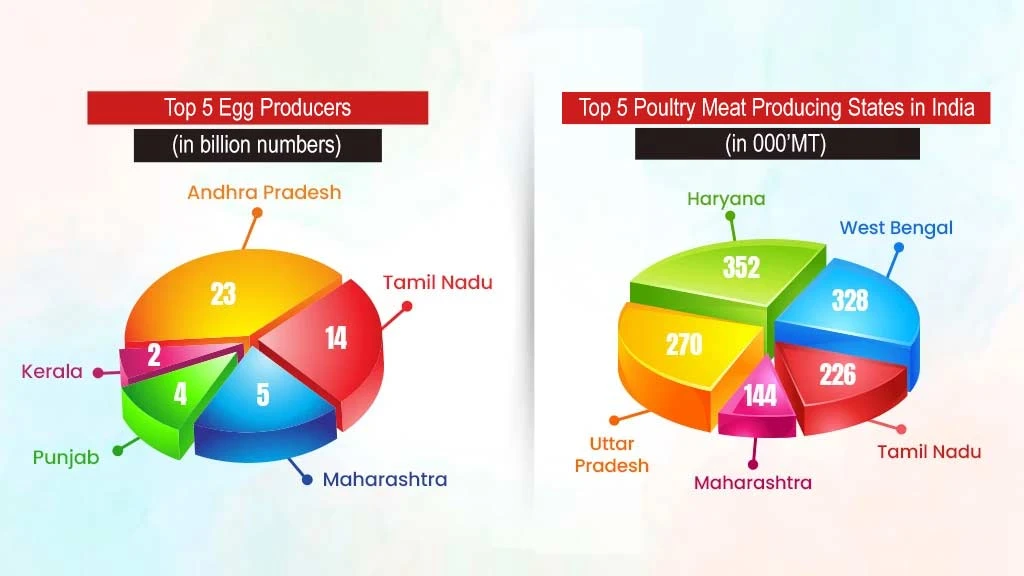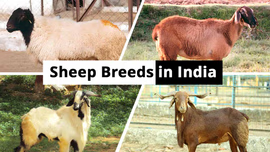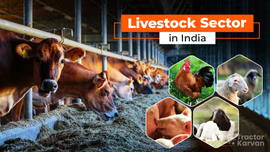How to Start a Poultry Farming Business in India?

Poultry farming, started as a backyard venture, is now one of the fastest-growing agri-businesses in India. It has huge potential to generate additional and stable income for rural communities. Starting a poultry farm includes thorough research about site selection, breed selection and care & management practices. This blog is all about the meaning and steps involved in starting a profitable poultry farming business in India.
Table of Contents
- What is Poultry Farming?
- What is the Current Scenario of Poultry Farm Business in India?
- What are the Benefits of Poultry Farming Business?
- How to Start a Poultry Farm Business in India?
- What is the Poultry Farming Cost and Profit in India?
- Which are the Top Poultry Farming States in India?
- Government Programmes to Promote Poultry Farming
- Final Thoughts
What is Poultry Farming?
Poultry farming involves hatching and rearing a broad category of domestic birds, such as different breeds of chicken, ducks, turkeys, etc., for meat and eggs production. It is considered as a complimentary farming activity performed for additional income. Contract farming is one of the confident ways to start a chicken farm business in India.
What is the Current Scenario of Poultry Farm Business in India?
The poultry farm business is the fastest-growing agri-business in India with around 3 million farmers involved in it, which accounts for 1.2% of the total GDP of India. As per the data of Asian Development Bank (ADB), the average growth rate of poultry meat production between 2011 and 2020 was 10.9%, which is double the average growth rate of other types of meat. It clearly shows the potential income from starting a poultry farming business.
Further, the production of eggs and broilers has been rising at a much greater pace compared to rise in agricultural crop production. Today, India is 3rd largest egg producer and 4th largest broiler chicken producer globally. Top 5 egg producing States are Andhra Pradesh (20.13%), Tamil Nadu (15.58%), Telangana (12.77%), West Bengal (9.93%) and Karnataka (6.51%).
As per APEDA, India exported USD 184.58 million poultry products in the FY24. The major export destinations were Oman, Sri Lanka, Maldives UAE and Qatar.
What are the Benefits of Poultry Farming Business?
Quick returns on investments, low initial investment, low maintenance cost, etc. are some of the benefits of poultry farm business in India. Let’s have a look at all the benefits in more detail below.
- Quick Returns on Investments: You can expect to reach Break-Even point in just six months because chickens mature very quickly.
- Low Initial Investment: The cost of establishing a poultry farm depends upon the size. You can start a small-scale poultry farm at a nominal cost of Rs. 50,000 only and expect to earn a decent profit.
- High Demand for Poultry: The demand for poultry in India is on the rise as it is a cheap source of animal protein and the dietary habits of Indian population is changing.
- Low Maintenance Cost: Compared to other livestock the cost of maintaining poultry is relatively lower due to small size of birds, efficient house designs, shorter production cycles and efficient shed designs.
- Employment Opportunities: Poultry farm provides direct and indirect employment to many people in India. There are employment opportunities in management, sales, and business development.
- An Additional Source of Income: With profitability in growing crops declining, farmers can put their land to efficient use by setting up a poultry farm and earn additional income.
How to Start a Poultry Farm Business in India?
Starting a poultry farming business in India requires extensive initial preparation, which is usually complex and time-consuming. However, with proper preparation, the business can quickly become successful and profitable. Let’s understand all the steps or requirements of starting a poultry business below.
Research and Business Plan
- Study the local market demand where you want to open it.
- Determine the list of equipment required.
- Select the variety of birds you want to breed like hens, ducks, etc.
- Decide upon the poultry farm type you want to start – broiler breeding, egg production, or both.
- Enquire about the permissions and licenses that need to be obtained for starting a poultry farm.
Selecting Poultry Farm Type
The housing space or shed dimension depends upon the number of hens in a poultry farm. Select your poultry farm depending upon the size as mentioned below.
|
Type of Poultry Farm |
Size (in Sq. Ft.) |
|
Battery cage poultry farm |
6000 |
|
Semi-range poultry farm |
8000 |
|
Free range poultry farm |
12,000 to 36,000 |
|
Completely wild poultry farm |
44,000 |
Determining the Breed Type
Determining the breed type is a crucial step in the poultry farm business. In India, poultry farming consists of broilers (meat production), layering (egg production), or both. There are more than 92 chicken varieties in India that produce meat and eggs. The 3 most common breed types are:
|
Breed Type |
Characteristics |
|
Layer Chickens |
|
|
Broiler Chickens |
|
|
Rooter Chickens |
|
Getting the Required Licenses
Obtaining essential permits and licenses is paramount while starting any business in India. To start a poultry farm business, some of the essential licenses required are:
- No Objection Certificate (NOC) from the village panchayat.
- NOC from the Central Pollution Control Board (CPCB).
- Permission from the electricity authority for the use of electricity.
- License from the Department of Groundwater.
- Registration of trademark for your poultry farm to prevent trademark violations.
Choosing the Right Infrastructure for an Ideal Poultry Farm
- Select a site that is well-connected to transportation modes and has availability of key resources, such as water and electricity. Please make sure that the decided site complies to local zoning regulations.
- For brooder management, construct a brooder house that is rain-proof, draft-free, and protected against predators. They should also have good ventilation and be free from a dusty environment.
- Proper housing is essential to prevent diseases and encourage the well-being of your poultry. The layout should support easy cleaning, waste management, and disease control.
- Construct rat proof civil structures to avoid entry of rats. Also, keep the shed clean and free from flies/mosquitoes, etc.
Care & Management of Poultry Farm
- Debeaking: It is the process of partially removing the beak of chickens to prevent feed wastage, cannibalism, and feather pecking.
- Incubation: The total incubation period is 28 days, and it requires a relative humidity of 75% throughout the period. On 25th day, the eggs are transferred from the setter into the hatcher. If eggs are held for more than a week before setting, they need to be turned daily.
- Vaccination: Use proper vaccination schedule for the chickens. Ensure using high quality vaccines purchased from reputed manufacturers. Any left-over vaccine should be properly disposed off.
- Feed & Water Management: Use high quality feed and clean and fresh water for the birds. Always have records on feed consumption per bird for each batch. Compare with the standard feed consumption pattern.
- Sanitization: Sanitize each and everything properly to get rid of any pests or disease infection of the birds.
- Litter Management: After the disposal of litter, walls and floors of the farm should be whitewashed with lime and disinfected with 0.5% malathion or DDT insecticide spray.
Marketing and Distribution of Poultry Products
- Make a marketing strategy to encourage your poultry products.
- Use both traditional and digital procedures to get to your target customers.
- Do not keep your birds beyond 6-7 weeks of age on the farm, as their feed efficiency will go down considerably.
- Focusing on product quality, as word-of-mouth advice, can impact on your business’ reputation.
What is the Poultry Farming Cost and Profit in India?
The cost of starting a poultry farming business in India ranges from Rs. 50,000 to Rs. 10,00,000*. The cost will depend upon the size of the poultry farm, as shown below:
|
Poultry Farm Size |
Estimated Cost (in Rupees) |
|
Small Scale |
50,000 – 1.50 lakhs |
|
Medium Scale |
1.50 lakhs – 3.50 lakhs |
|
Large Scale |
7.00 lakhs – 10.00 lakhs |
As per the study of Asian Development Bank, with an investment cost of Rs. 10 lakhs on 10,000 square feet shed, one can earn a profit of Rs. 4 lakhs annually and recover the money in 2 years.
Which are the Top Poultry Farming States in India?

Note: The above data provides the eggs and meat production in the top poultry farming states of India.
Government Programmes to Promote Poultry Farming
The Indian government has been bringing policies and programmes from time to time to boost small-scale businesses, including poultry farming. Some of the programmes related to the Poultry farming business are:
- National Action Plan for Egg & Poultry 2022: It seeks to increase egg production to 136 billion and poultry population to 1290.45 million by 2022.
- Prevention and Control of Infectious and Contagious Diseases in Animals Act, 2009: It aims to prevent the expansion of diseases in poultry.
- Comprehensive Support for Individuals/ Entrepreneurs for Poultry Farming: It supports establishing parent farms, rural hatcheries, brooder-cum-mother units to produce hatching eggs, and rearing chicks.
- Animal Husbandry Infrastructure Development Fund (AHIDF): It provides funds for establishing infrastructure for poultry feed and setting up technologically assisted poultry farms.
- National Livestock Mission: It offers up to 50% subsidy for establishing a parent farm, rural hatchery, brooder-cum-mother unit to produce hatching eggs with a minimum of 1000 parent layers and rearing of chicks for up to 4 weeks in the mother unit.
- Poultry Venture Capital Fund Scheme: It is a sub-scheme of National Livestock Mission and provides subsidy of 25% on the project cost up to a maximum limit of Rs. 25 lakhs.
- MUDRA Loan: Helps small agri-businesses like poultry farming and enables youths to become first-generation entrepreneurs and allows the growth of existing small businesses. You must register with the Udyam/MSME portal to obtain MUDRA loans.
Final Thoughts
We have seen that setting up a poultry farm business needs careful planning, proper selection of poultry farm type and breed, and effective poultry farm care and management. Poultry farming business in India is a profitable venture if managed well. With active government support, the scope for establishing a profitable poultry farming business is immense. So, what are you waiting for? Start your own poultry farm business today.
Frequently Asked Questions On How to Start a Poultry Farming Business in India?
1. What is poultry farming?
Poultry farming is a method that involves commercially nurturing a wide category of domestic birds, such as hens, turkeys, etc., to increase the production of meat and eggs.
2. How to start a poultry farm business?
To start a poultry farm business you need to research, plan, select the right type of breeds and right poultry farm type. Besides, effective poultry farm care and management in addition to marketing and distribution is required.
3. What are the benefits of poultry farming over cattle farming?
Poultry farming gives high return on less investment and can quickly become successful and profitable.
4. Is poultry farming profitable in India?
Yes, with active government support, the poultry farming is highly profitable in India.
5. Why is poultry farming important?
It provides an additional source of income and provides cheap animal protein.


Related Blogs











